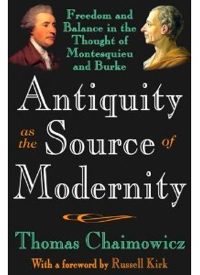
For those readers with an interest in the intellectual roots of modern conservative thought, one may well describe Thomas Chaimowicz’s Antiquity as the Source of Modernity as “long-anticipated.” In fact, it is the last work to be published in the Transaction Library of Conservative Thought commissioned by the late Russell Kirk. Dr. Kirk’s introduction was penned 20 years ago (the German edition was published in 1985), and it highlights the significance of Chaimowicz’s work for conservative political discourse:
Among other merits, Professor Chaimowicz’s learned study points out that Montesquieu’s thought differed radically from that of John Locke. Chaimowicz also remarks, with what may startle some readers, that “in the first part of his Reflections on the Revolution in France, Burke is attacking not only the preacher Dr. Price and the members of the ‘Revolution Society,’ but also the principles of John Locke.” And he makes clearer than has any other writer the influence of Montesquieu upon Burke’s concept of “mixed government.”
The brevity of Antiquity as the Source of Modernity should not be confused with a lack of substantive content. Chaimowicz’s superb treatment of the origins of Montesquieu’s thought in the writers of classic antiquity demonstrates the continuity of thought at the heart of conservative political theory in the West.
Tracing the origins of Montesquieu’s conservative thought is central to Chaimowicz’s endeavors; in this, the author consciously aligns his work with the thought of José Ortega y Gasset, who “considered a detailed study of Roman history the prerequisite for understanding our own time.” Chaimowicz maintains that true freedom is not found in pursuit of the utopias of the ideologists; rather, “freedom can develop only within the framework of established tradition. It does not come about through the design of a constitution based on abstract principles, but rather through the balance of areas of state power that have grown up through the centuries.”
Tracing the origins of Montesquieu’s thought, Chaimowicz declares that “the leitmotiv of Motesquieu’s entire work might be found in these words of Livy: ‘When I turn to antiquity, my intellect, too, becomes ancient.” Tracing the origins of his thought, therefore, means tracing the influences of certain authors, including Livy, Cicero and Tacitus. Thus Montesquieu’s notion of “the republic” is centered on Athens, Sparta and Rome; virtue (vertu) is necessary as the dominant principle of the republic—which “does not fit the reality of the republics existing in Montesquieu’s time, as he never tires of mentioning.” The development of a ‘mixed’ constitution, and the separation of powers, is thus traced back to antiquity.
Chaimowicz defends the continuity of thought from antiquity to the American Republic through, among other instrumental means, the writings of Montesquieu:
We should also seriously consider Montesquieu’s fundamental influence in the United States, as it appears through Burke. The importance of Montesquieu’s thesis for the Founding Fathers of the American Constitution can be seen in No. 47 of The Federalist, where James Madison speaks of the “Montesquieuian oracle” and establishes his connection with the Constitution of the United States. In his book, The Roots of the American Order, Russell Kirk shows us the part these writings played at the Constitutional Convention in 1787: “… no man would be more frequently cited and quoted than Charles Louis de Secondat, Baron de Montesquieu…. All of Montesquieu’s writings were eagerly read, in their youth, by many of the men who signed the Declaration of Independence and drew up the Constitution of the United States; others absorbed Montesquieu’s ideas at second hand through Blackstone’s Commentaries on the Laws of England.
Against such sources of continuity, Machiavelli is presented as the opponent of ordered liberty and tradition. In this regard, Chaimowicz declares, “Machiavelli’s influence on the intellectual and political world of the seventeenth and eighteenth centuries cannot be exaggerated.” Actually, he places responsibility for the horrors of the French Revolution on Machiavelli’s stoop: “Ultimately, the Terror of the Republic of Virtue during the French Revolution was the product of ancient Roman conceptions which Machiavelli adapted to his doctrine of power and which were carried over into the intellectual world of the sixteenth century. The Terror set an example for all later forms of terror whenever it was a matter of leading a state back to its often only imaginary, fictitious first principles.”
Ideological “first principles” are no substitute for the various traditions which work together to uphold order and freedom. Man is never a tabula rasa, and no society can be created from whole cloth. Thus Chaimowicz writes,
The concept of heredity cannot be separated from Common Law thinking or the belief in an ‘Ancient Constitution.’ When Burke says that “People will not look forward to posterity, who never look backward to their ancestors,” is he not restating what was said by the Briton Calgacus in Tacitus’s Agricola (32,4) — a passage that he mentioned to James Boswell in a letter of 1779? Calgacus tells his comrades-in-arms: “When you now enter into battle, think of your ancestors and your descendants.” It is the “parternership between those who are living, those who are dead, and those who are to be born.”
It is not possible to isolate one aspect of constitutional history, identify it as out-dated, and consign it effectively to the care of tradition, like an item in a museum, without at the same time endangering the future.
Against the background of the modern decay of Western civilization, a reader may be tempted to despair at reading the insightful analysis provided by Antiquity as the Source of Modernity. Chaimowicz certainly does not counsel such despair, but the road back to civilization is hardly the primrose path of policy ‘wonks’ and neoconservative illusionists.
We must ask whether and how a change for the better can take place. Certainly such a change is possible; however, it cannot be effected through force and moral constraint. It must come about through broad consensus. This consensus can emerge only when the common citizen, who knows very little about the difficulties of governing a state, is well informed and when, instead of ideologically tainted writing and teaching of history in schools, a fair portrayal of the situation is presented to him. The consensus also emerges when the media are in the hands of responsible, enlightened and highly educated people. Finally, it will emerge when the highest authorities of state do not primarily represent the interests of a party and the majority of the moment in order to follow, for example, a fiscal policy that creates a permanent budget deficit.
In short, the conditions needed for such a restoration of the republic are far from being realized; indeed, it is hard to conceive of a set of circumstances which could lead to such improvement. In this regard, the conservative places his hope in divine providence, and labors within the narrow circle which has been afforded to him according to his vocation, as father, citizen, worker, etc. Modern man has often confused his capacities which those which are strictly divine in nature; restoration of the Republic, and a contribution to conservative order, begin with embracing the limits of one’s own authority, and the debt which one owes from birth to those who have come before him, and those who shall inherit this patrimony.
Antiquity as the Source of Modernity, by Thomas Chaimowicz, New Brunswick and London: Transaction Publishers, 2008,139 pages, hardcover.



